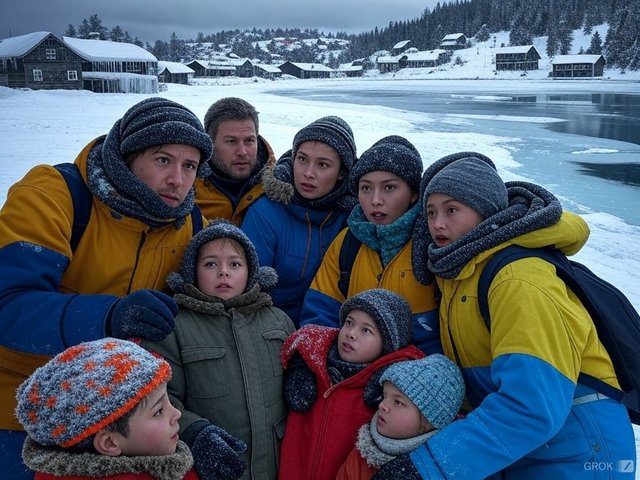
Imagine a scenario where, in a blink of an eye, the global temperature drops by 3 degrees Celsius. This isn't a gradual change over centuries but an immediate, drastic alteration to our planet's climate. Here, we explore the ramifications of such an event on our environment, economy, and society.
Environmental Impact
A sudden 3-degree drop would thrust the world into an abrupt cold snap, akin to a global winter.
Agriculture: The immediate effect would be catastrophic for agriculture. Crops not adapted to such low temperatures would die off, leading to massive food shortages. The growing seasons would be disrupted, potentially shifting traditional farming zones further towards the equator.
Wildlife: Many species would face extinction or severe population declines. Animals adapted to specific temperature ranges would struggle to survive. Migratory patterns would be thrown into chaos, with many species unable to adapt quickly enough.
Water Bodies: Lakes and rivers could freeze over in regions not accustomed to such conditions, disrupting aquatic ecosystems and water availability for human use. The salinity and currents of oceans would be affected, potentially leading to changes in global weather patterns.
Ice and Snow: There would be an unprecedented expansion of ice caps and glaciers, raising the albedo effect (reflectivity of Earth's surface), which could paradoxically lead to further cooling by reflecting more solar energy back into space.
Economic Consequences
Energy Demand: Heating demands would skyrocket, overwhelming current infrastructure in unprepared regions. This would spike energy prices, leading to economic strain or collapse in some areas.
Transport and Infrastructure: Roads, bridges, and buildings not designed for such cold would fail under the stress of ice and snow. Air travel, shipping, and land transportation would face severe disruptions due to frozen conditions.
Global Trade: With agricultural products diminishing and transportation hindered, global trade would suffer. Countries reliant on imports for food might see famine, while those with surplus would face logistical nightmares in distribution.
Human Society
Health: The sudden drop in temperature would increase mortality rates, particularly among the elderly, children, and the homeless. There would be a rise in hypothermia, frostbite, and respiratory issues exacerbated by the cold.
Population Displacement: Millions might be forced to migrate towards warmer regions, leading to humanitarian crises, border conflicts, and overcrowding in unprepared areas.
Social Services: Emergency services, healthcare, and social systems would be overwhelmed. Governments would need to act swiftly, redirecting resources to manage the crisis, possibly leading to political instability if unprepared or under-resourced.
Long-term Implications
Climate Feedback Loops: The sudden cooling could trigger feedback loops, like the release of methane from permafrost, potentially leading to a new equilibrium state for the Earth's climate, though this would be uncertain and potentially chaotic.
Technological Adaptation: Humanity would be forced to innovate at an unprecedented pace, developing new heating technologies, insulated living spaces, and energy-efficient systems to adapt to the new normal.
Conclusion
While a 3-degree instant drop in global temperature is purely speculative, it serves as a stark reminder of how finely balanced our climate is and how dependent we are on it for our way of life. This thought experiment underscores the importance of understanding and preparing for climate changes, whether warming or cooling, and the critical need for global cooperation in climate science and policy.
Call to Action
Let's use this scenario not to spread fear but to foster awareness. Support research into climate resilience, advocate for sustainable practices, and prepare our communities for any climatic shifts, no matter how unlikely.
Author's Note
This article is a speculative piece meant to explore the impacts of an extreme climate change scenario. It does not reflect current scientific predictions but serves as a discussion starter on climate adaptability and resilience.
Engage with Us
What steps do you think society should take to be better prepared for unexpected climate changes? Share your thoughts in the comments below.
Note : USE of Grok 2.0 for image and content generation